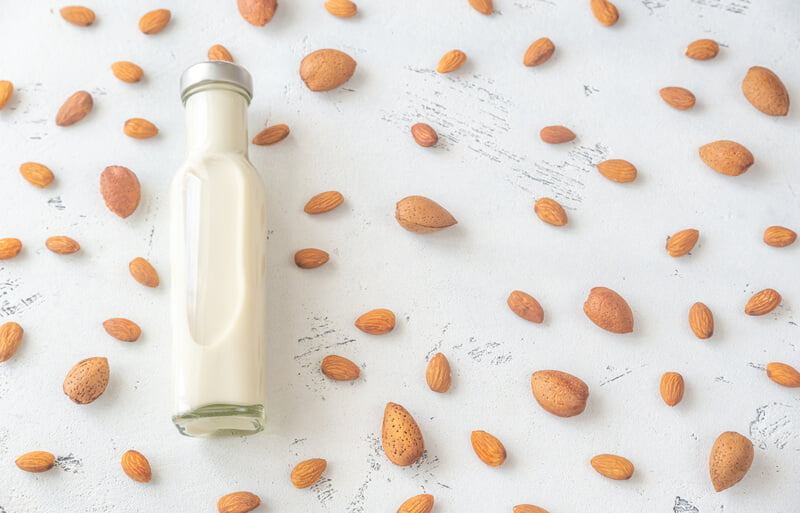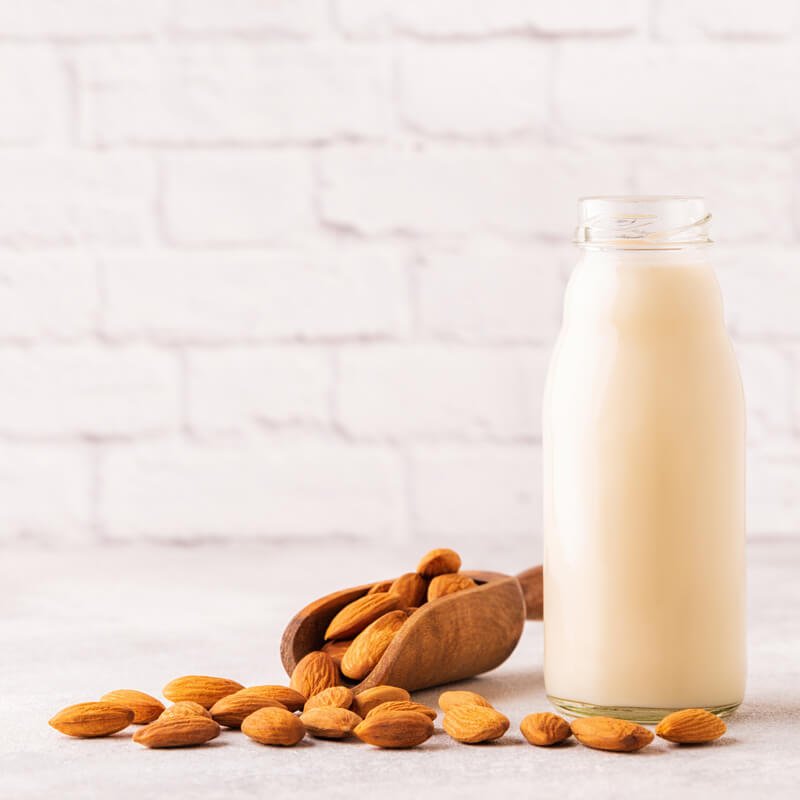If you’re dealing with an ulcer, the last thing you want is to drink milk that upsets your stomach. This probably has you wondering if that almond milk sitting in your fridge is good for ulcers.
Almond milk can relieve the pain associated with ulcers by attaching to the extra acid in your stomach. Almond milk also reduces the amount of harmful bacteria in your gut to help the ulcer heal and prevent future ulcers from forming.
This article will take a deep dive into the science of how almond milk helps ulcers and guide you in how to choose the best almond milk to ease your pain.
How Does Almond Milk Help Ulcers?
Almond milk helps to both ease your pain and treat the underlying cause of your ulcer. It accomplishes this through several different mechanisms.
Research demonstrates that the primary reason almond milk eases your pain is by reducing the overall amount of acidity in your gut lining.
When you have too much acid in your gut lining, ulcers may form, and you’ll experience an uncomfortable burning sensation.
Getting rid of that extra acid with almond milk helps your ulcer to heal more quickly and eliminates the discomfort caused by the ulcer.
In addition to decreasing your gut acidity, almond milk has also been shown to be anti-inflammatory and reduces the bacteria in your gut that may cause ulcers in the first place.

Almond Milk and H. Pylori
A well-studied bacteria in our gut that causes ulcers and digestive issues is called Helicobacter Pylori, or H. Pylori for short.
It’s estimated that 50% of the world’s population has been infected with H.Pylori during their life. Odds are you have or will come into contact with this bacterium at some point in time.
The typical treatment for H. Pylori is antibiotics and antacids. However, almonds are proving to be a potentially viable natural alternative with fewer side effects.
Research found that the skin of almonds is one of the most effective antibacterial treatments for eliminating H. Pylori in our stomach lining.
It’s theorized that consuming almonds in any form may help to prevent ulcer formation based on this data.
Here's a video for more details on H. pylori and its relation to ulcers.
Almond Milk and Your Gut pH Levels
Beyond eliminating harmful bacteria, almond milk is generally a pH friendly milk that won’t increase irritation in your gut lining.
Liquids that are acidic in nature will increase burning and irritation in your gut if you have an ulcer. This is why you want to seek out more alkaline drinks to avoid making your symptoms worse.
Raw almond milk has a pH of about 7, which makes it slightly alkaline. However, sweetened almond milks like those found in the grocery store can have a pH as low as 4.5, making them more acidic.
If you have an ulcer, you may want to make your own almond milk at home or limit additives to avoid causing more digestive pain.
Is Almond Milk Better for Ulcers than Traditional Cow Milk?
You may have also heard that drinking traditional cow-based milk will help your ulcer.
It is true that cow-based milk can temporarily ease ulcer related pain.
The cow-based milk will coat your gut lining and block it from being exposed to more acid for a short time.
However, cow-based milk has also been found to increase your gut’s acid production and causes more secretion of digestive chemicals into your gut. This will make your ulcer symptoms worse down the road.
Cow milk may be an effective temporary band aid for your ulcer pain, but almond milk does not have these side effects making it the better choice for promoting your long term gut health.
Related: Almond Milk vs Cow Milk
Are All Almond Milks Good for Ulcers?
Now that you know the many benefits of almond milk for ulcers, it’s time to figure out which of all the available options is the best choice for your ulcer.
Unfortunately, not all almond milks are created equal. Many commercial almond milks are filled with additives and a few of these additives could potentially irritate your ulcer.
Some common additives found in almond milk include:
- Sugar
- Salt
- Gums
- Lecithin
- Carrageenan
While all additives aren’t inherently bad, you want to make sure you avoid additives that increase inflammation and digestive stress when dealing with an ulcer.

How Does Carrageenan in Almond Milk Affect Ulcers?
A common additive in commercial almond milks is called carrageenan. Try saying that one five times fast.
Carrageenan is an extract from red seaweed that is typically used to help thicken almond milk to create an enjoyable texture.
Unfortunately, studies have shown that carrageenan increases inflammation in your gut lining. And to add insult to injury, it also has been found to be particularly difficult to digest.
This increase in inflammation and taxing of your digestive system can worsen your ulcer symptoms as well as delay the overall healing of the ulcer.
If you’re dealing with an ulcer, be sure to check the almond milk label for carrageenan to avoid an upset stomach.
How Do Gum Additives in Almond Milk Affect Ulcers?
When you’re reading the label on commercial almond milk, another common additive you’re likely to come across is gum.
Gum comes in many forms and is primarily used in almond milk to help thicken it up to give it a more milk-like texture.
Certain gums, like cellulose gum, have been found to erode the lining of your intestines which significantly increases your likelihood of developing an ulcer and intensifies your pain.
As a rule of thumb, it’s probably best to avoid gums in your almond milk if you’re treating an ulcer.
How Does Salt in Almond Milk Affect Ulcers?
Salt is probably one of the few additives in almond milk that you can easily pronounce and recognize. Unfortunately, this doesn’t make it any better in regard to helping out your ulcer.
Remember the H.Pylori bacteria we discussed earlier that causes ulcers in our gut? Studies have found that salt in your stomach appears to help this bacterium multiply and become more harmful.
When H. Pylori increases in intensity, your likelihood of developing ulcers and other gut related dysfunction increases along with it.
Small amounts of salt may be okay as the study highlighted that this effect occurred when salt levels were high.
However, it’s in your best interest to avoid salt in your almond milk altogether if possible when you have an ulcer.

Sweetened vs. Unsweetened Almond Milk for Ulcers
Another common choice you face when it comes to purchasing almond milk is opting for an option with or without added sugar.
As we mentioned before, the sweetened option is more likely to irritate your ulcer symptoms as it’s slightly more acidic.
Beyond just being more acidic, the sugar found in sweetened almond milk will further increase inflammation in your gut.
And you guessed it- this will make your ulcer symptoms worse and inhibit tissue healing.
The safest choice when it comes to avoiding more pain with your ulcer is raw unsweetened almond milk.
Are All Almond Milk Additives Bad for Ulcers?
While additives like sugar, carrageenan, and gums are generally bad for ulcers, there is one additive in almond milk that may be beneficial for your ulcer.
The useful additive found in almond milk is called lecithin.
It’s often derived from soybeans and is used to help enhance the solubility of the almonds with water in almond milk.
Research indicates that this additive enhances the mucus in your gut lining to protect it from forming ulcers and promotes healing of current ulcers.
However, it’s rare that you will find lecithin as the only additive in an almond milk.
The potential benefits of consuming an almond milk with lecithin don’t outweigh the potential negative effects that accompany the additional additives that are likely present alongside it.
How Much Almond Milk Should I Drink to Help My Ulcer?
Now that you have your almond milk in hand, you’re probably wondering how much you should drink.
There are no specific guidelines indicating exactly how much almond milk you should drink to help your ulcer.
With that being said, we know that excessive consumption of liquids when you have an ulcer may create too much stress for your digestive system.
When consuming almond milk for your ulcer, try out a small glass first to assess your body’s response.
If it goes well, having a few glasses of almond milk spread throughout the day is unlikely to cause any problems.
If you notice your body has a particularly positive response to the almond milk, you may consider consuming more while your ulcer is healing.

Final Thoughts
Overall, almond milk is a good choice for people dealing with painful ulcers. The almond milk will help ease your pain while simultaneously fighting off harmful gut bacteria that could cause more ulcers.
It’s important to remember that while almond milk is generally good for ulcers, not all commercial almond milks will help your ulcer feel better.
Avoiding almond milk with additives like sugar, salt, carrageenan and gum will assure that drinking the almond milk doesn’t make your symptoms worse.
After trying it for yourself, you may just find that a glass of raw almond milk a day keeps the ulcer pain away!
